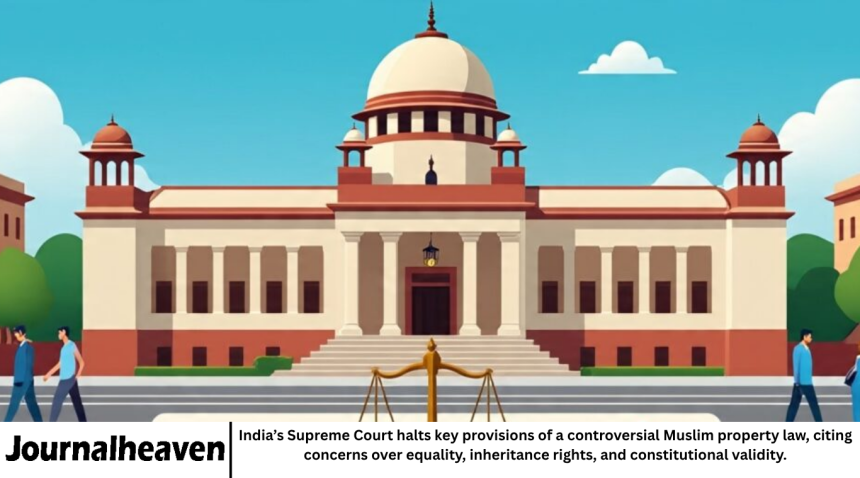India’s Supreme Court has taken a major step by suspending significant parts of a contentious Muslim property law. This decision reflects ongoing debates about inheritance rights, equality, and constitutional protections within India’s diverse legal landscape. The ruling has sparked wide discussions across the country about the balance between religious laws and secular legal principles.
- Background: What Is the Muslim Women (Protection of Rights on Marriage) Law?
- The Supreme Court’s Intervention
- Key Issues Raised by the Amendments
- Reactions Across India
- Legal Context: Personal Laws and the Indian Constitution
- The Path Ahead: What to Expect Next
- Broader Implications for Women’s Rights in India
- Frequently Asked Questions
- Conclusion
The suspended provisions relate to recent amendments that had altered how Muslim women inherit property. Critics argue these changes undermine women’s rights, while supporters claim they protect religious practices. The Supreme Court’s intervention signals an effort to ensure that any such laws comply with constitutional guarantees.
Background: What Is the Muslim Women (Protection of Rights on Marriage) Law?
The law in question is officially known as the Muslim Women (Protection of Rights on Marriage) Act, but the focus here is on amendments affecting property rights of Muslim women. Traditionally, Islamic personal law governs inheritance and marriage-related rights for Muslims in India, often leading to complex and sometimes controversial outcomes.
In recent years, some state governments introduced amendments aimed at restricting Muslim women’s rights to inherit property after divorce or the husband’s death. These amendments sparked heated debates, with critics alleging they were discriminatory and violated the constitutional right to equality.
The Supreme Court’s Intervention
The Supreme Court’s suspension of key provisions came after petitions challenged the amendments as unconstitutional. The Court’s decision places a temporary hold on the enforcement of these provisions, pending a full hearing on their legality.
In its order, the Court emphasized the importance of protecting women’s rights and ensuring that any law aligns with the Indian Constitution, especially Articles 14 (Equality before law) and 15 (Prohibition of discrimination).
This move has been welcomed by women’s rights groups, legal experts, and civil society organizations, who see it as a significant step toward gender justice.
Key Issues Raised by the Amendments
The amendments raised several critical legal and social issues:
-
Equality and Non-Discrimination: Critics argue the amendments discriminate against Muslim women by limiting their inheritance rights, contradicting constitutional guarantees of equality.
-
Religious Freedom vs. Fundamental Rights: Supporters claim these laws protect religious freedom and personal laws but the Court must balance this with fundamental rights.
-
Impact on Muslim Women: The changes could leave divorced or widowed Muslim women vulnerable, lacking financial security and legal protections.
-
Precedent for Other Personal Laws: The case may influence how India’s plural legal system reconciles personal laws with constitutional rights across other communities.
Reactions Across India
The Court’s suspension has triggered varied reactions:
-
Women’s Rights Advocates: They hailed the decision as a victory for gender equality and constitutional supremacy.
-
Religious Groups: Some Islamic organizations expressed concern, stating that personal laws should be respected and safeguarded from government interference.
-
Political Responses: Various political parties have used the issue to reinforce their stance on minority rights and secularism.
The debate highlights the challenges India faces in balancing religious diversity with universal rights and social justice.
Legal Context: Personal Laws and the Indian Constitution
India’s legal system recognizes personal laws based on religion for matters like marriage, divorce, and inheritance. This pluralistic approach aims to respect religious autonomy but has often resulted in conflicting rights, especially for women.
The Constitution guarantees equality and prohibits discrimination, creating tensions between personal laws and fundamental rights. Courts have increasingly intervened to ensure personal laws do not violate constitutional principles, leading to landmark judgments in recent years.
The Supreme Court’s current action fits into this ongoing judicial effort to harmonize religious personal laws with constitutional values.
The Path Ahead: What to Expect Next
The suspension is a temporary measure. The Supreme Court will hold detailed hearings to examine the amendments’ legality and constitutionality.
Depending on the final verdict, the ruling could reshape the legal status of Muslim women’s property rights in India and set precedent for similar cases involving personal laws.
The case also adds momentum to broader discussions on legal reforms and women’s rights in India’s diverse society.
Broader Implications for Women’s Rights in India
This development underscores the ongoing struggle for gender equality in India. While progress has been made, women in many communities still face legal and social hurdles.
Ensuring women’s inheritance rights is crucial for their economic independence and social status. The Court’s stance reinforces the message that constitutional rights must prevail over discriminatory practices, no matter their cultural or religious origin.
The decision may inspire further advocacy and legal reforms aimed at protecting women’s rights nationwide.
Frequently Asked Questions
What parts of the Muslim property law were suspended?
The Supreme Court suspended key provisions that limited Muslim women’s inheritance rights after marriage dissolution or a husband’s death.
Why did the Supreme Court suspend these provisions?
The Court found concerns over equality, discrimination, and constitutional validity requiring review before enforcement.
How do these amendments affect Muslim women?
They potentially reduce financial security and property rights for divorced or widowed Muslim women.
Does this suspension mean the entire law is invalid?
No. The suspension is temporary, pending a full judicial review to determine constitutionality.
How does this ruling impact other religious personal laws?
It sets a precedent emphasizing constitutional rights over personal laws that discriminate, possibly influencing reforms across communities.
What constitutional articles are relevant in this case?
Articles 14 and 15, which guarantee equality before the law and prohibit discrimination, are central to the Court’s concerns.
What is the significance of this ruling for women’s rights in India?
It reinforces the constitutional protection of women’s rights and challenges discriminatory practices in personal laws.
Conclusion
India’s Supreme Court suspension of key provisions in the Muslim property law marks a significant moment in the country’s journey toward gender justice and constitutional compliance. The ruling balances respect for religious personal laws with the imperative to uphold equality and non-discrimination.
As the case proceeds, it will have lasting effects on how India reconciles its plural legal system with fundamental rights, particularly for women’s inheritance and property protections.
The eyes of the nation remain on the judiciary to safeguard justice, fairness, and the rights of all citizens, regardless of religion or gender.








